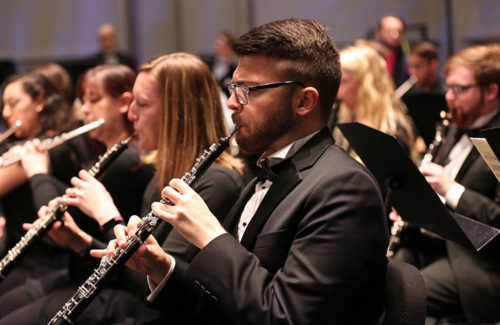
AYS’ new Citizen Musician Fellow and Principal Oboe, Noah Breneman, has big aspirations for helping AYS in our community engagement initiatives this season. After gaining years of experience in music education and earning his bachelors and masters in music performance from Penn State and USC, Noah is eager to help change the narrative for the classical music industry and curate musical experiences that are for all people. Read on to learn more about Noah, his advice for young musicians, and plans as AYS’ next Citizen Musician Fellow.
I’m from Reading, Pennsylvania, which is an hour outside of Philadelphia. You might have heard Reading before in the game Monopoly as in The Reading Railroad. I grew up in a family full of musicians and music enthusiasts, though none of my family members pursued music professionally. I was introduced to music at a young age, but never played an instrument until my fifth grade band class.
My first instrument was the euphonium, a low brass instrument, which I played all the way through high school in marching band. I wasn’t introduced to my current instrument, oboe, until Junior High. That’s when I became more interested and curious about music. I used to take home school instruments every weekend and learn how to play them. I experimented with piano and different woodwinds, but I really liked oboe and bassoon. I started playing bassoon in junior high band and oboe outside of school through private lessons because it’s a hard instrument to learn on your own.
In High School I started to play oboe more and decided that’s what I really wanted to pursue. Over the course of my high school years, I started narrowing down the other instruments I played because it got to a point where I was playing a different instrument in almost every ensemble.
Because I’m from a family of music lovers, I was introduced to music at a young age by being taken to concerts or hearing music at people’s houses. That had a large influence on me wanting to pursue music professionally and remain curious about it.
I think I knew I wanted to pursue music from a young age. I remember, in 7th grade, I was getting to know my band director more and started “writing” music at home. However, one day he was absent from school and we had a general substitute who was not musically trained. I, out of the blue, asked if I could lead rehearsal that day. The sub was completely shocked, but said sure. I had never stood in front of a group before, and never conducted before, but after observing my band director lead rehearsal I felt that I could do it. This was definitely a pivotal moment for me, and I learned that I really wanted to move forward with my musical studies. I don’t think I realized I wanted to do it professionally until I heard about my oboe teacher’s kids pursuing music professionally at universities. I didn’t realize there were different pathways for oboe and music performance until then, and that’s when it clicked that I could make a career out of music.
Many of my music educators from school were alumni from Penn State, so originally my path was to become a music educator and teach band, since I was really into it. Even in high school, my teachers would give me opportunities to conduct different school groups and arrange music for them. So, I actually started off as a music education major at Penn State.
Then, I sort of realized going through my classes that I liked it, but it wasn’t what I wanted to be doing right then and there. In my third year, we started to get really specific on education, and I still wanted to focus on oboe. I wanted to be practicing and making music all day long and, unfortunately, there’s just not enough time for that as a music education major. I’m grateful for my educational experiences, but I realized I wanted to continue performing and work towards being the best musician I could possibly be. During junior year was when I made the switch to major in oboe performance. After Penn State, I wanted to continue my studies further and applied for the masters program at USC, which I began in August 2018.
My advice for young musicians who are or want to study music performance, is to do some self-reflection on if music is actually what they want to be doing. A lot of people go into music, go all the way through their degrees, and then they get out of school and realize this isn’t exactly what they want to be doing. I think this process needs to be talked about more amongst musicians. When I was auditioning for grad schools one professor said, “you should do this only if it’s the only thing that you can physically do with your life.” For a professional music career, you really need to know deep down that this is all you want to do because it’s a really challenging path.
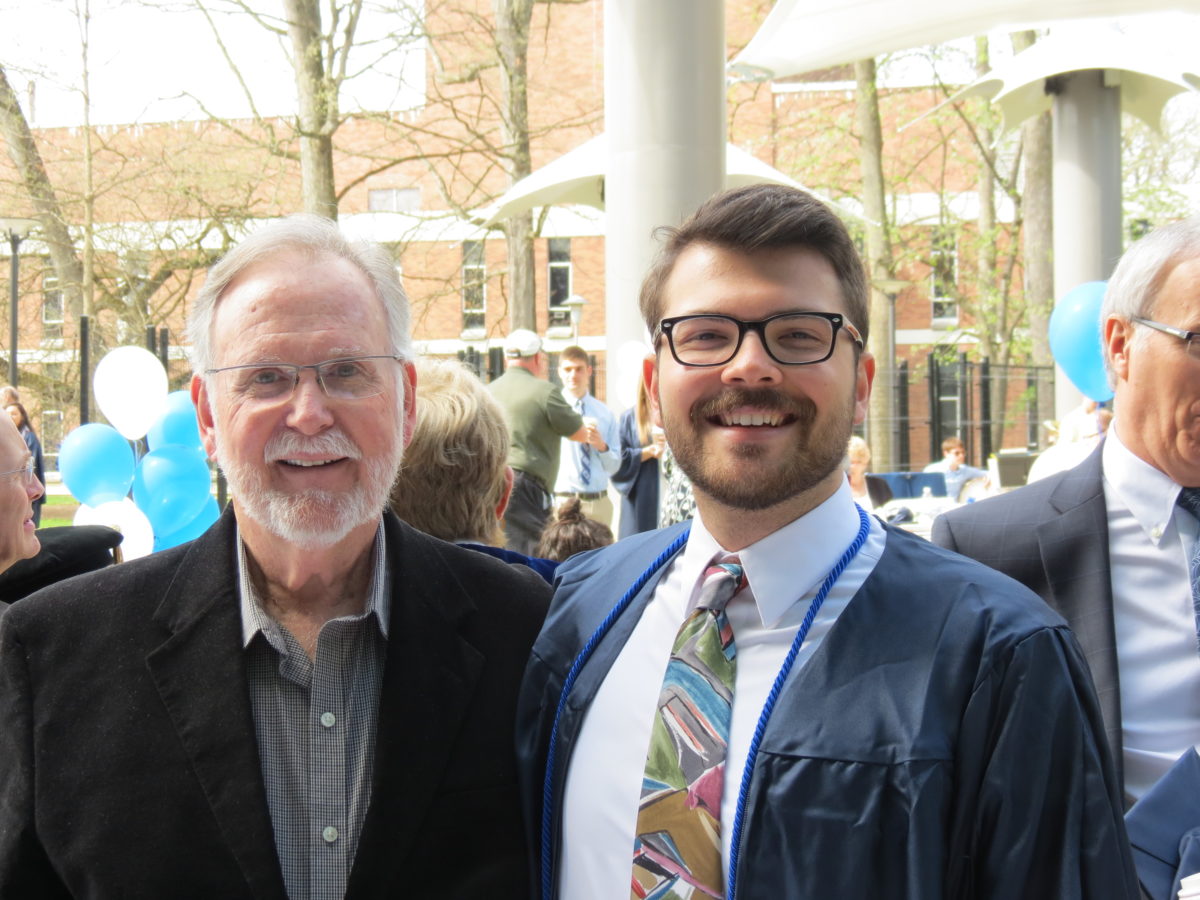

Oboe Professor Tim Hurtz and Noah at his Penn State graduation.
Noah performing with the Penn State Philharmonic Orchestra.
Penn State has an annual President’s Concert, which got us off campus and into a big legitimate concert venue on the East Coast. Freshman year we played at the Kimmel Center in Philadelphia, which was extra special because I spent my teenage years attending many Philadelphia Orchestra concerts there with my mother. During senior year, the President’s Concert was held there again, so that was a great full circle moment for me to book-end my time at Penn State.
At USC, the wind ensemble was invited to play at the CBDNA conference (College Band Directors National Association), which was held in Arizona. It was a great experience to play at a national conference with all the big composers and conductors in the band world there. The concert was really enthusiastically received by the attendees, and it’s always rewarding to play for new audiences. At school, I loved doing concerts that got us out playing for new people and in different spaces than we were used to.
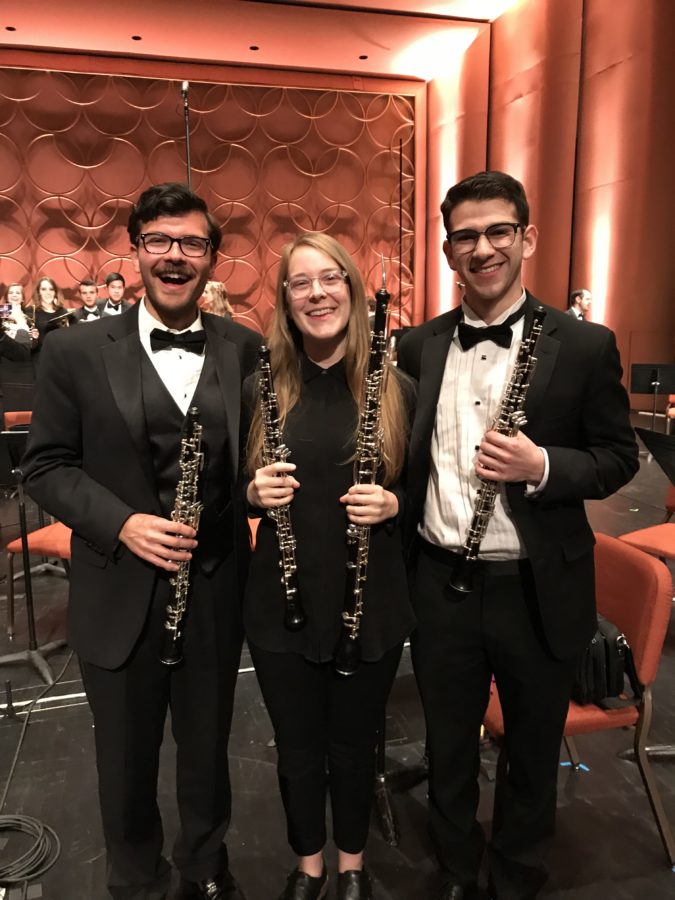
Noah and the USC Wind Ensemble at the CBDNA Conference.
Recital concert performed by Noah.
I first heard of AYS through my undergrad oboe professor, Tim Hurtz, who is an alumni of AYS from the 70s. He’s a Los Angeles native and inspired me to attend USC for my masters and audition for AYS. I auditioned back in August 2018 for the third oboe/english horn position when I first moved here. I ended up not winning that audition, but was put on the sub list. I was called to sub twice during the 2018/19 and 2019/20 seasons and had opportunities to play at venues such as Royce Hall and Walt Disney Concert Hall, which was my first time in those venues! The February 2020 concert at Walt Disney Concert Hall was actually the last orchestra concert I played before the pandemic.
Because of the pandemic, I moved back to Pennsylvania for 15 months. While I was at home, AYS had an opening for Principal Oboe. I sent in an audition tape and was offered the position! I ultimately wanted to move back to LA, and this gave me a more concrete reason to do so, since I had a position in a group to come back to. I haven’t played any concerts yet this season because I was still at home, but the upcoming concert on March 6, 2022 at Walt Disney Concert Hall will be my first concert back with AYS!
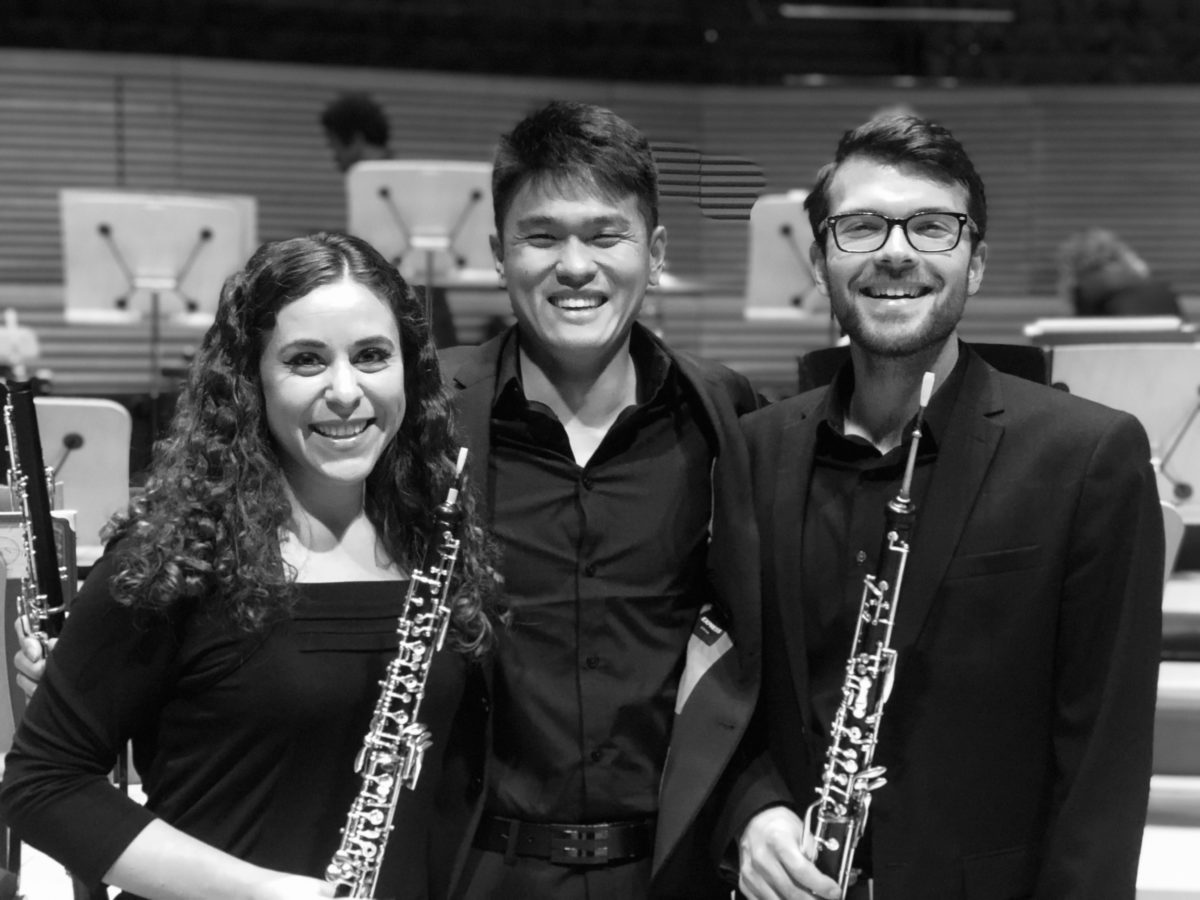
AYS Walt Disney Concert Hall, February 2020
I’m excited for more community concerts and learning about the different organizations that AYS partners with here in Los Angeles. I’m looking forward to exploring how we can bring what we do to them in a way that will be beneficial and impactful for their community members and their varying needs. I especially love outdoor concerts, and am really excited to be a part of those!
I hope to program music that is relevant to our audiences and help curate an experience that both educates and is impactful for people. I want to assist in choosing repertoire that is relevant and showcases the ensembles we use for those concerts. I also want to be a resource and help train AYS musicians on how to provide insightful information about their instrument, the music they are performing, and classical music in general during community concerts.
Because music is for the people, and we haven’t always done a great job in classical music of presenting music for all people and to all people. It’s great when we can go out into the community or use a space that isn’t a traditional venue and bring music to people who may not have heard it before. They can experience something new and also learn a bit about classical music. There are still barriers in the way of getting to the concert hall, so we need to be in the community more.
There’s also a lot of stereotypes in classical music about the way it is presented and the music itself. Over decades, we have performed the same type of stuff and in the same way, which makes people think of classical music as being only one way. However, classical music is also the film music being written today and other contemporary stuff. It is inherently a diverse genre, because of composers from different countries, time periods, etc. To bring music to people in spaces and ways that they might not be able to access otherwise, I think is very important.
If you’re a performing musician, especially in a place like Los Angeles, where you play all sorts of gigs, these community concerts help you develop deeper connections to an audience. In concert halls, you’re a bit separated from the audience with little to no interaction. When you do more community based things or play in intimate settings, you’re able to get more feedback from the audience and see things that you might not have seen before. You experience how music impacts people firsthand.
My advice is to look into opportunities where you are directly interacting with people. For example, different types of outreach programs, community concerts, planning recitals, looking for people who host recitals at small venues where you are directly talking to and interacting with other people, and bringing music to them. In my experience, when you are interacting with an audience or talking directly to people about what you do, it’s a very different feeling walking away, in comparison to a regular concert or gig. You feel as though you’ve made a difference, and that people walk away with new information and new experiences.
I just moved back to LA, so my short term goals are to pick up where I left off before I moved away and see where my career goes. The opportunities here are really astonishing and when you do your research and see all the different groups and avenues for performance, it’s really mind blowing. Of course, you have to seek these out and network, but I love how diverse the opportunities are here. I’m excited to see how my career will grow and what avenues I get into out here.
The only pop artist I really follow and listen to is Adele, and it’s been that way since high school. I like listening to a lot of John Adams, the contemporary composer, especially his piano works and operas. I listen to a lot of oboe stuff, and throughout the pandemic I’ve been trying to learn about different rep for my instrument that I didn’t learn during school. I share a huge playlist on Spotify with my friend that has so much oboe music from all over the world. I’ve also been listening to a lot of Bach lately. I have a book of his cello suites arranged for oboe and english horn, so I’ve been working on those trying to sound and imitate the style just like on a cello.
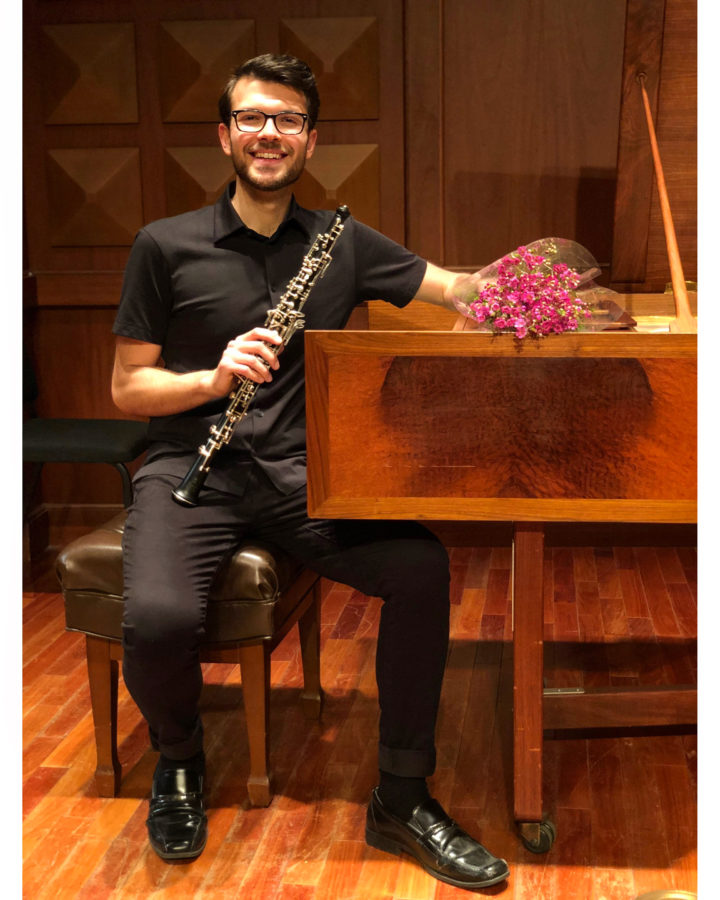
About Noah:
Noah Breneman was born and raised in Reading Pennsylvania. Although he joined band in 5th grade (playing Euphonium), it wasn’t until Jr. High that he discovered the Oboe. Noah attended Penn State University, graduating magna cum laude with a Bachelor’s degree in Oboe Performance. After 22 years in Pennsylvania, Noah moved to Los Angeles to pursue a Masters degree at the University of Southern California. While at USC, Noah performed in a woodwind quintet, The Santa Ana Winds, which competed in the 2019 Plowman Chamber Music Competition. His oboe teachers have included Jill Haley, Tim Hurtz, Joel Timm, and Marion Kuszyk. Noah is excited to be back in Los Angeles now that things are opening up and is equally excited to be joining AYS as their new Principal Oboe and Citizen Musicianship Fellow!
If you want to support AYS and the education of young musicians, consider making a donation today. Learn more about our Champion program and sponsoring a musician on our website or by emailing development@AYSymphony.org.